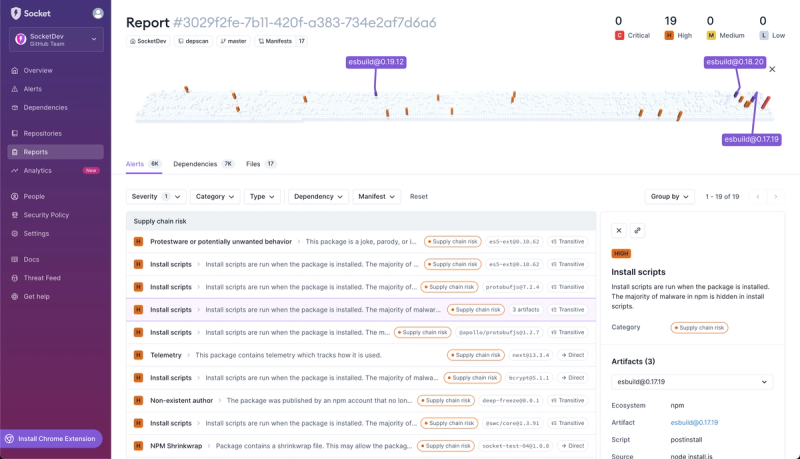
Company News
Connect with Socket at RSA and BSidesSF 2024
Come meet the Socket team at BSidesSF and RSA! We're sponsoring several fun networking events and we would love to see you there.
silkrouter
Advanced tools
Weekly downloads
Readme
Silk router is a reactive and light-weight (1.5kb gzipped) routing library.
npm install --save silkrouter rxjs
Silk router is dependant on rxjs for classes such as Observable and
Subscription. Please install this package as a separate (peer) dependency.
Router classimport { Router } from 'silkrouter';
...
const router = new Router();
route handlerrouter.subscribe((e) => {
// Listens to changes to route
});
routerouter.set("/path/to/route"); // Route should always start with a '/'
Silkrouter also adds hash routing capability. Hash routes are useful when
back-end doesn't have a way to support page paths. Hash routing can be enabled
via hashRouting flag.
const router = new Router({
hashRouting: true,
});
Please note that silkrouter replaces the current path with a hash path by default. To disable this behaviour you need to preserve the current path.
const router = new Router({
hashRouting: true,
preservePath: true,
});
Path preservation only works for hash routing.
Silkrouter automatically calls the handler as soon as it is attached. This behaviour allow consumers to mount components on page load. To attach the listeners silently, you can disable this behaviour.
const router = new Router({
init: false,
});
Please note that disabling initialization doesn't effect the routing functionality. Route changes are still caught by the handlers.
From version 5 onwards silkrouter does not ship its own operators. You can
create your own operators as needed, or use the ones built by the awesome
JavaScript community.
const router = new Router();
router.pipe(myOperator()).subscribe((event) => {
// ...
});
myOperator.js
export function myOperator() {
return (observable) =>
new Observable((subscriber) => {
const currSubscription = observable.subscribe({
next(value) {
// ...
subscriber.next(/* updated value */);
},
error: subscriber.error,
complete: subscriber.complete,
});
// ...
return () => {
return currSubscription.unsubscribe();
};
});
}
We invite you all to contribute to silkrouter and make it better. Please feel
free to open discussions, fork this repository and raise PRs.
FAQs
Silk router is an app routing library
The npm package silkrouter receives a total of 58 weekly downloads. As such, silkrouter popularity was classified as not popular.
We found that silkrouter demonstrated a healthy version release cadence and project activity because the last version was released less than a year ago. It has 1 open source maintainer collaborating on the project.
Did you know?

Socket for GitHub automatically highlights issues in each pull request and monitors the health of all your open source dependencies. Discover the contents of your packages and block harmful activity before you install or update your dependencies.

Company News
Come meet the Socket team at BSidesSF and RSA! We're sponsoring several fun networking events and we would love to see you there.

Security News
OSI is starting a conversation aimed at removing the excuse of the SaaS loophole for companies navigating licensing and the complexities of doing business with open source.

Product
We're introducing dependency visualization for reports - get a quick impression of the state of your dependencies without getting lost in the details.